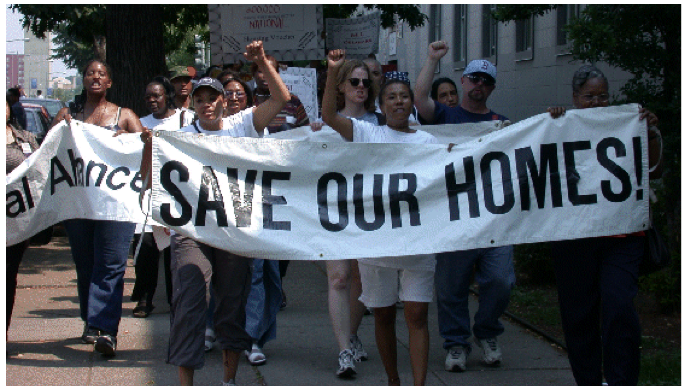CommentsDEEGAN ON LA-One of the city’s under-publicized scandals is the long-running shotgun marriage between city council members and developers using the Ellis Act to force tenant evictions throughout the city.
Anyone that has been caught in this compact between developers and council members knows how devastating these evictions can be. They lead to despair, sometimes homelessness, and definitely serve to shut down affordable housing in neighborhoods since any replacement housing is priced at higher, market rate levels.
Once today’s affordable housing is removed there will be no substitute -- just new housing at significantly higher prices. Once affordable rent-control housing is taken away, it is gone forever.
A degree of unscrupulousness is evident and not surprising when you consider that, according to the Coalition For Economic Survival, “Ellis Act evictions are being done by developers who have owned the property less than a year…[and have] “been corrupted by large developers whose sole objective is to acquire rent-control housing, destroy it, evict tenants and replace the existing housing with high-priced luxury housing.”
The Ellis Act is a three-decade old state law originally intended to help small landlords exit the rental business, but developers have figured out how to use it to drive their profit engines. Twenty-thousand rent-controlled units, home to low and moderate income tenants, seniors, disabled and working families, were destroyed between 2001 and 2016, according to CES.
The long and abusive use of Ellis Act evictions throughout the city is reflected on this map that was created by the Anti-Eviction Mapping Project and the Coalition for Economic Survival.
Could that be changing?
Help may be on the way for tenants at risk of being evicted by landlords that use the Ellis Act, a state law with good intentions enacted in the 1980’s originally intended to help small landlords exit the rental business, but that has morphed into a device to vacate a building so it can be turned by developers into condos or market rate housing.
Two motions passed by the LA City Council in the past couple of sessions may bring some order, as well as some relief for tenants. One, Motion CF14-0268-S5, “to modify the Rent Stabilization Ordinance (RSO) in order to strengthen provisions relating to the enforcement of the Ellis Act and the preservation of RSO units,” was signed into law by the Mayor on April 19.
The other is Motion CF17-0203, directing “the HCID (Housing + Community Investment Department) and the Planning Department to track the cumulative net gain/loss of affordable housing units [i.e. covenanted units and RSO units] in the City, and regularly post this information online as a public dashboard that includes cumulative data as well as annual and quarterly accounting.”
There are currently 630,000 units stabilized with caps on rent increases and additional protections for tenants under the City’s Rent Stabilization Ordinance. That’s what will be tracked.
Together, these motions and the apparent new understanding by council members of the crisis state of Ellis Act evictions should help ease anxieties by tenants that their housing will be swept away from under them.
Both motions passed without dissent, although not all council members voted. The motion to modify RSO’s was introduced by Gil Cedillo (CD1) (in the heat of a very tight race to retain his council seat) and seconded by Mike Bonin (CD11). Council members Jose Huizar (CD14) and Joe Buscaino (CD15) were absent for the vote.
Huizar may have missed one important vote, but was key in the second vote to track housing by introducing the motion that was seconded by Marqueece Harris-Dawson (CD8). All council members voted for that one except Paul Krekorian (CD2), who was absent for the vote.
This more clearly brings into focus and lets the council members understand what tenants already know: that they are being squeezed out of affordable housing in neighborhoods they call “home.” To tell an evicted tenant there is “affordable housing” at another, more distant location, is not a viable solution.
Time will tell how serious the politicos are about reining in the out-of-control developers. Council members Huizar and Cedillo serve on the Planning and Land Use Management (PLUM) committee (Huizar is chair) so they are in the catbird seats to be among the most vigilant observers and enforcers of land use and development in the city. Now, with these two motions, they have some added resources to protect renters.
(Tim Deegan is a long-time resident and community leader in the Miracle Mile, who has served as board chair at the Mid City West Community Council and on the board of the Miracle Mile Civic Coalition. Tim can be reached at [email protected].) Edited for CityWatch by Linda Abrams.
Explore
Our mission is to promote and facilitate civic engagement and neighborhood empowerment, and to hold area government and its politicians accountable.

 CityWatch Los Angeles
Politics. Perspective. Participation.
CityWatch Los Angeles
Politics. Perspective. Participation.
22
Tue, Apr















